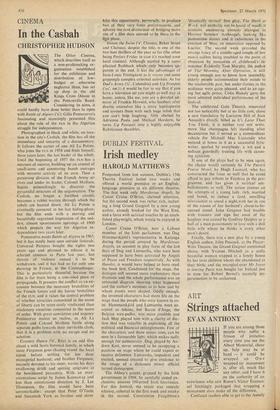DUBLIN FESTIVAL
Irish medley
HAROLD MATTHEWS
Postponed from last autumn, Dublin's 13th Theatre Festival lasted two weeks and offered a world premiere or an English- language premiere in six different theatres. The first week only Murderous Angels, by Conor Cruise O'Brien, claimed attention, but the second week was rather rich, includ- ing a long Grand Guignol by a new young author, already booked for the West End, and a farce with satirical touches by an estab- lished playwright, which would be enjoyed in London.
Conor Cruise O'Brien, now a Labour member of the Irish parliament, was Dag Hammarskjold's representative in Katanga during the period covered by Murderous Angels, an account in play form of the last days of Dag and Lumumba, who were here supposed to have been activated by Angels of Peace and Freedom respectively. As with Hamlet, it would have helped to have read the book first. Condensed for' the stage, the dialogue still seemed more explanatory than dramatic and the whole performance was an animated diagram showing what happened and the author's surmises as to how and by whom events were shaped. Oddly enough, the invented characters had more life on the stage than the people who were known to ex- ist. Hammarskjold and Lumumba were ac- cepted as tokens, but Baron d'Auge, the Belgian wire-puller, was more .credible and Jack May played him with a clarity of dic- tion that was valuable in explaining all the political and financial entanglements. Few of
the characters, and those minor ones, can be seen in a favourable light, which makes sadly enough for authenticity. Dag, played by An- drew Keir, never seemed to be occupying a position on stage where he could expect or receive deference. Lumumba, impudent and excited, seemed created to give credence to the image of a dishonest minor official turned demagogue.
The Abbey's patent, granted by the Irish government in 1904, by carefully coded ex- clusions, ensures 100-proof Irish histrionics. For this festival, the result was entirely whimsy, celestial in the first week and murky in the second. Constantine Fitzgibbon's
'drastically revised' first play, The Devil at Work, will probably not be heard of much: it contains unamusing comedy dialogue in Heaven between Archangels looking like pantomime dames and it culminates in the creation of Man, an innovation Opposed by Lucifer. The second week provided the strange fancy of a middle-aged couple of low moral calibre being troubled to the point of obsession by memories of childhood's in- nocence. Evidently Tom Murphy, the author of The 'Morning After Optimism, is still young enough not to know how insensibly elderly people accommodate their minds to the unalterable past, but under-forties in the audience were quite pleased, and as an age- ing but agile ponce. Colin Blakely gave the most admired individual performance of the festival.
The celebrated Gate Theatre, renovated not too noticeably but at no little.cost, chose a new translation by Lucienne Hill of Jean Anouilh's Ornifle billed as It's Later Than You Think; it is neither rose nor noire, more like champagne left standing after decantation but it served as a commodious vehicle for Micheal Mac Liammoir who seemed at home in it as a successful lyric- writer, spoiled by everybody, a wit and a seducer guardedly treating life with caress- ing cynicism.
If one of the plays had to be seen again, the choice would certainly be The Patrick Pearse Motel, by Hugh Leonard, who has constructed the farce so well that he could afford to pay tribute to Feydeau in the pro- gramme, and has given it satirical em- bellishments as well. The action centres on the attempts of a young lady, rich, married and bored, to induce a tired, unwilling televisionist to spend a night.with her in one of the rooms of her husband's about-to-be- opened motel. John Gregson had trouble with trousers and zips but most of the laughter was caused by Godfrey Quigley as a bull of a man passionately in love with a dull little wife whom he thinks •is every other man's desire.
Finally, there was a new play by a young English author, John Peacock, at the Player- Wills Theatre, the Grand Guignol mentioned above, with Yvonne Mitchell as a sadly beautiful woman trapped in a lonely house by her twin children whom she abandoned at their birth; and the wrangled-over Mr Joyce is leaving Paris was bought for Ireland just in time for Robert Bernal's masterly im- personation to be acclaimed.










































 Previous page
Previous page